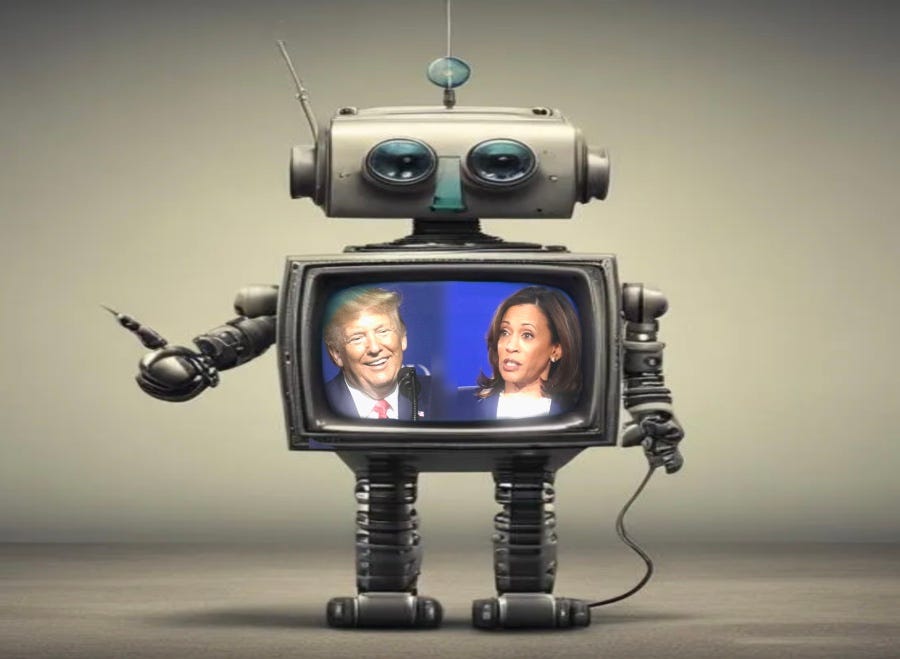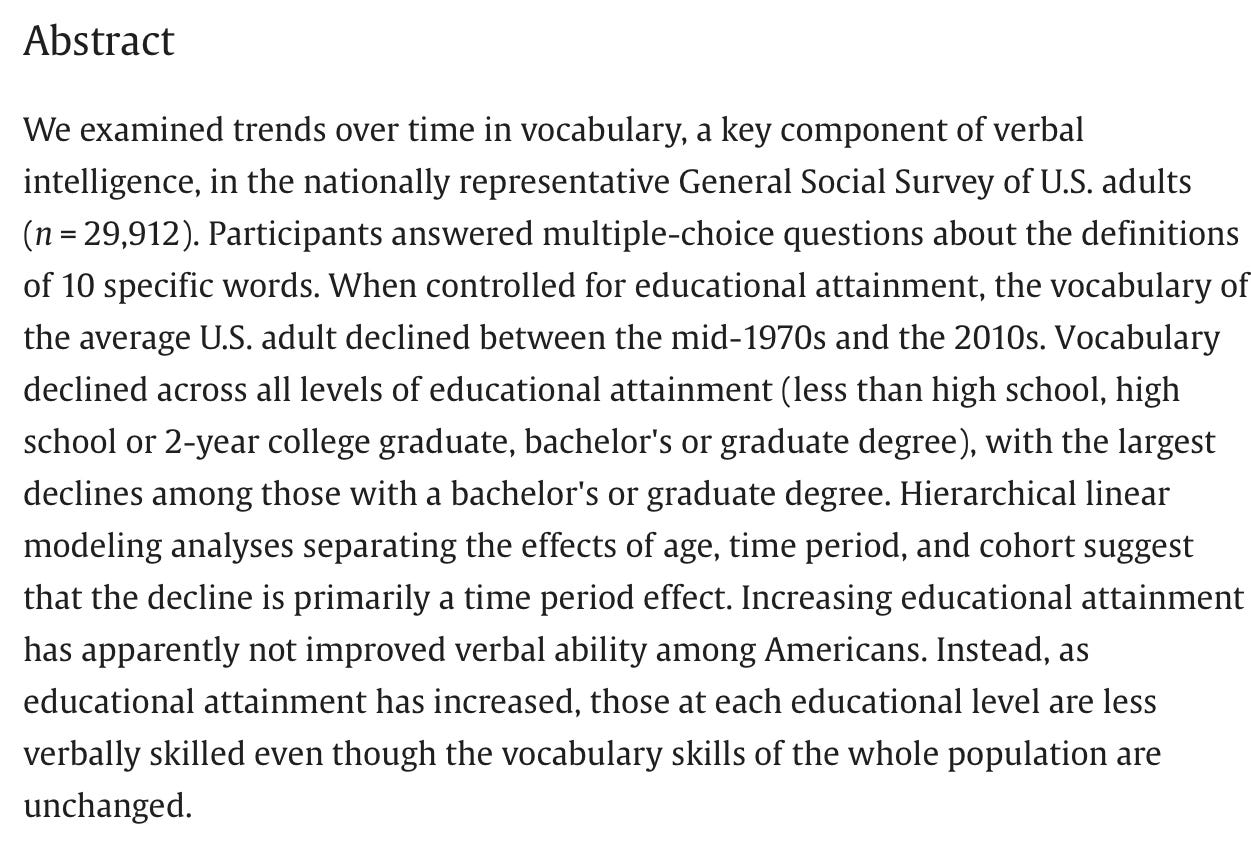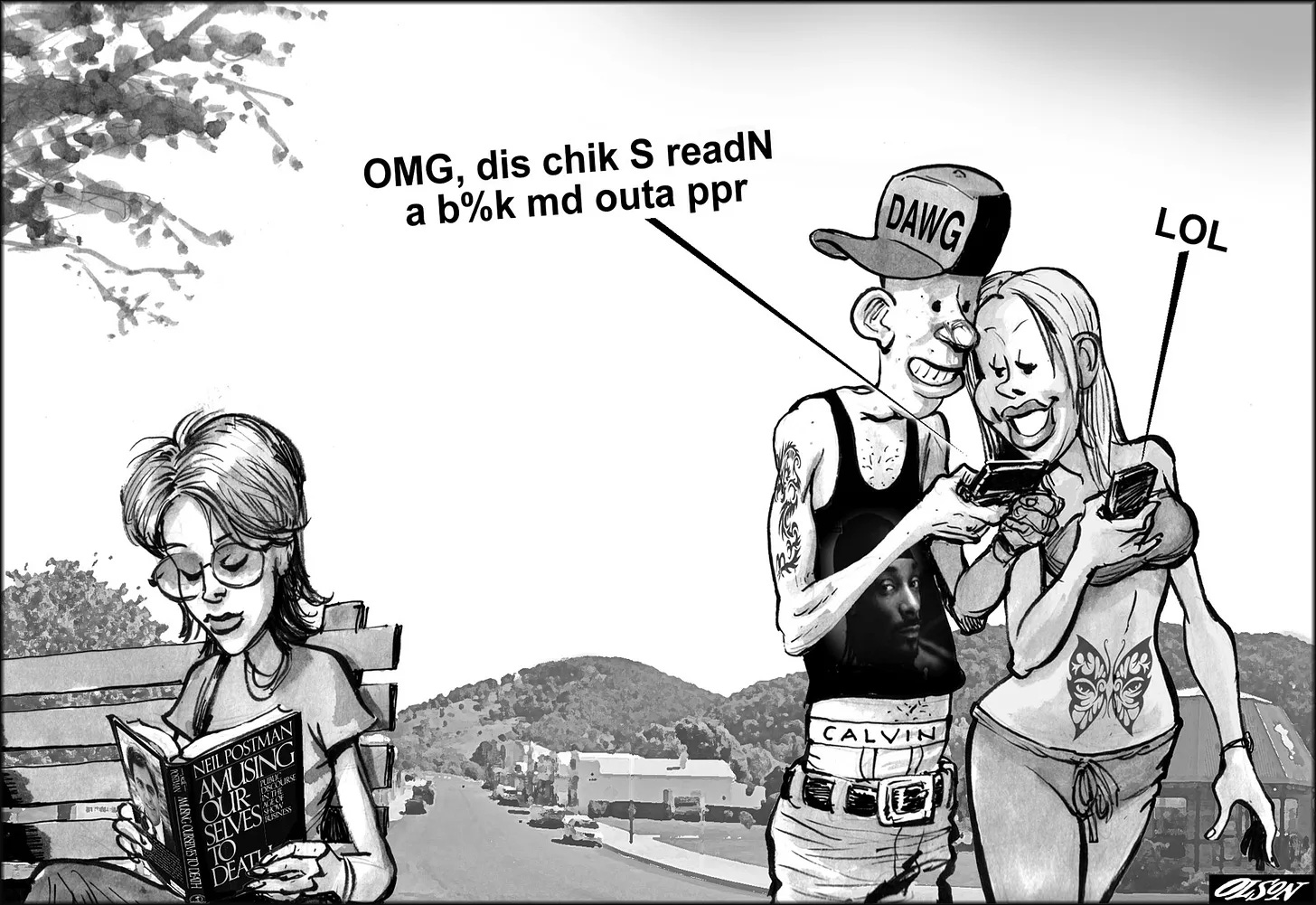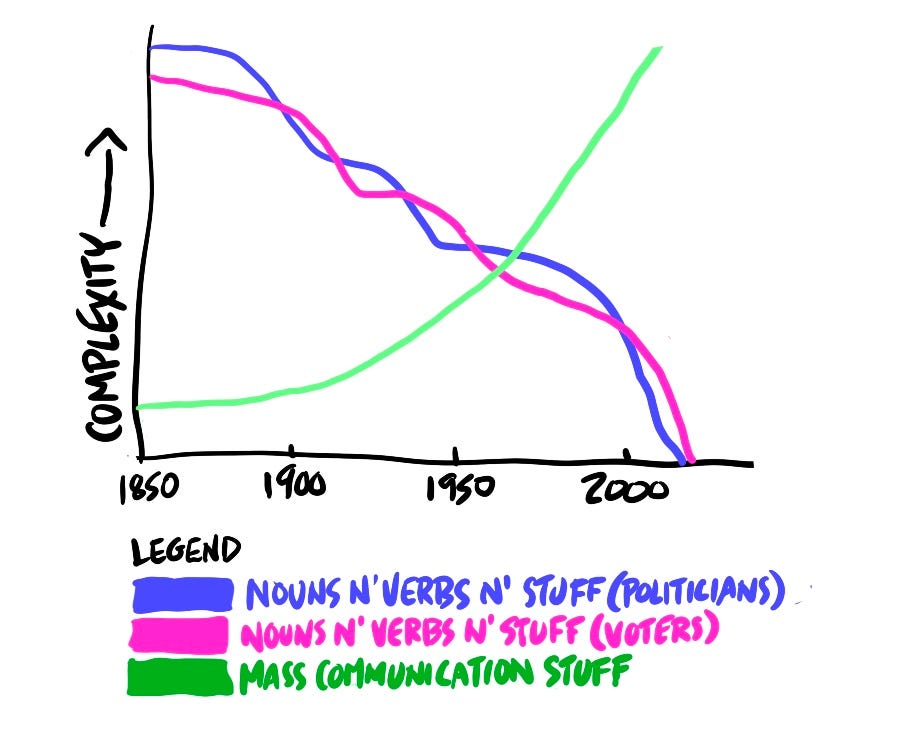Democrats, Republicans, and the Singularity of Stupid
Tracking American decline through language
“It is time for us to do what we have been doing. And that time is every day.”
— Kamala Harris
“That is especially true when it comes to the climate crisis, which is why we will work together and continue to work together to address these issues, to tackle these challenges, and to work together as we continue to work, operating from the new norms, rules, and agreements that we will convene to work together on to galvanize global action. With that, I thank you all. This is a matter of urgent priority for all of us. And I know we will work on this together.”
— Kamala Harris
“We’ve been to the border. So this whole, this whole, this whole thing about the border. We’ve been to the border. We’ve been to the border.”
— Kamala Harris
I present the above quotes to dangle the possibility that newly-minted 2024 Democratic presidential candidate Kamala Harris is as inarticulate as Donald Trump and her boss, Joe Biden. That shouldn’t surprise us. Cognitively impaired discourse is as bipartisan as drone attacks on Mideast wedding parties.
In any case, Republican leaders have long been the masters of broken rhetoric. President George W. Bush was infamous for his wrestling matches with the spoken word. His father, George Sr., was also something of an involuntary entertainer at the microphone, while the latter’s vice-president, Dan Quayle, regularly performed gaffes memorable enough to inspire a quarterly newsletter (which I subscribed to).
I can’t resist including a few Quayle quotes. They’re like candy.
“Hawaii has always been a very pivotal role in the Pacific. It is in the Pacific. It is a part of the United States that is an island that is right here."
(Dan Quayle during a visit to Hawaii in 1989)
"If we don't succeed, we run the risk of failure."
(J. Danforth Quayle)
"Republicans understand the importance of bondage between a mother and child."
(Vice President Dan Quayle)
"What a waste it is to lose one's mind. Or not to have a mind is being very wasteful. How true that is."
(Vice President Dan Quayle - this was part of his address to the United Negro College Fund, whose slogan is "a mind is a terrible thing to waste")
"The Holocaust was an obscene period in our nation's history. I mean in this century's history. But we all lived in this century. I didn't live in this century."
(Vice President Dan Quayle, 9/15/88)
"I believe we are on an irreversible trend toward more freedom and democracy - but that could change."
(Vice President Dan Quayle, 5/22/89)
But I digress. One of my early moments of political awakening came in the mid-eighties, during a national address by President Ronald Reagan. At one point his Teleprompter went blank, leaving the former B-movie actor to fumble and sputter before falling silent for what seemed like an eternity. Eventually the device recovered and Reagan lurched to life again, like one of the animatronic dummies from Disneyland’s ‘Pirates of the Caribbean.’
During the appalling gap of time in which words failed him, the “Great Communicator” couldn't recover the thread, or even the context, of his speech. He quite literally didn't have a clue what he was talking about. The Emperor's clothes had vapourized on camera and he was struck dumb, his mouth working ellipses of silent panic.
The poor Emperor stood naked as a mole rat before millions. Yet the most telling part in this incident was the nonresponse of television talking heads immediately after the speech, including journalist George F. Will, who wrote the damn thing. They gravely parsed the particulars of the presentation, without a single peep about the septuagenarian’s stunned state. I doubt this was just guardians of the free press being polite to a leader past his best-before date. It was more like a bunch of hacks being in on a closed circle of speech-craft, commentary and deflection.
"Well, I learned a lot...I went down to (Latin America) to find out from them and (learn) their views. You'd be surprised. They're all individual countries."
—President Ronald Reagan
Reagan’s glitch didn’t measure a blip on the pre-Internet political media radar. I suppose in that sense things have ‘improved.’ Today, a gaffe like his would be captured and dissected and memed for days afterward, like Biden’s “we beat Medicare” comment.
What’s surprising is how much more robust and respectable the political debate culture was in America almost two centuries before Biden and Trump.
“I am highly intelligent. I know words. I know the best words.” — President Donald Trump
What Kind of Audience is This?
In his seminal 1985 book, Amusing Ourselves to Death, the late media critic Neil Postman noted the astounding stamina of engaged American listeners in the nineteenth century.
“The first of the seven famous debates between Abraham Lincoln and Stephen A. Douglas took place on August 21, 1858, in Ottowa, Illinois. Their arrangement provided that Douglas would speak first, for one hour; Lincoln would take an hour and a half to reply; Douglas, a half hour to rebut Lincoln's reply. This debate was considerably shorter than those to which the two men were accustomed. In fact, they had tangled several times before, and all of their encounters had been much lengthier and more exhausting. For example, on October 16, 1854, in Peoria, Illinois, Douglas delivered a three-hour address to which Lincoln, by agreement, was to respond. When Lincoln's turn came, he reminded the audience that it was already 5 p.m., that he would probably require as much time as Douglas and that Douglas was still scheduled for a rebuttal. He proposed, therefore, that the audience go home, have dinner, and return refreshed for four more hours of talk. ' The audience amiably agreed, and matters proceeded as Lincoln had outlined. “
“What kind of audience was this?” asked Postman. “Who were these people who could so cheerfully accommodate themselves to seven hours of oratory?” He regarded them as Americans who understood that political awareness was integral to their responsibilities as informed citizens.
This habit of patient, hours-long listening was mirrored in the complex oratory of political figures of the time — from Lincoln in America to Disraeli in Britain.
Postman analyzed the language Lincoln uses during the debate. He quoted a particularly lengthy and nuanced sentence from the senator, and noted that today’s politicians are far less likely to communicate like this — perhaps in part because they’re incapable, or want to reach the broadest audience without confusion.
Rarely is the question asked: Is our children learning?"
—President George W. Bush, Jan. 11, 2000
In the early sixties, political leaders like Eisenhower and his successor John F. Kennedy were still conveying complex and even challenging information to the American public, confident they would get a fair hearing. This was when mass media was still in diapers, of course. Television culture soon began to thrive on soundbites, which encouraged politicians to convey as much (or as little) as possible in the smallest amount of time.
Today’s media-barraged voter is fundamentally different from 19th century Americans, for whom “the use of language as a means of complex argument was an important, pleasurable and common form of discourse in almost every public arena,” Postman wrote.
Even before the publication of Amusing Ourselves to Death, the decades-long decline in American political discourse was glaring enough to commodify as entertainment. In the memorable 1979 film “Being There,” based on a novel of the same name by Jerzy Kosinski, Peter Sellers played a kindly, mentally disabled gardener who is encouraged to run for the presidency after impressing a succession of influential figures with his gnomic observations.
The role of mainstream media
You could chart a descending line on a graph of the past two centuries, representing the complexity of vocabulary and sentence structure in political speeches and debates. The latter would start with Lincoln and Douglas in the 19th century, descend to Nixon and Kennedy in the 20th century, and plunge down to George W. Bush and Al Gore, before reaching a nadir with Biden and Trump and Harris in the 21st century. (Certainly the decision to run increasingly geriatric candidates has played a role in this decline.)
You could add a related line of descent on this chart, plotting in the decades-long decline in vocabulary among educated adults. I imagine these two lines forming a braid of national loss.
The media has played a pivotal role in this decline across both sides of the border, as I know from personal experience.
Throughout my four decade newspaper stretch, I would occasionally sprinkle lesser-known words through my articles and columns. Not to impress, but because I often couldn’t find simpler synonyms in addressing complicated matters. Anyway, sometime around 2012 I was sitting at a table at a newspaper award banquet, when I made eye contact with some woman I had never met before. She immediately beetled over to the seat next to mine, displacing the reporter I’d saved it for. Before I could politely share this, she introduced herself as the publisher of the newspaper chain. My heart sank.
Pleasantries were exchanged and Sally (not her real name) told me how much she loved my work. “And I’m so glad I have a degree so I can understand what you’re writing!” she said brightly, adding something to the effect that not every reader had a degree, or was as clever as herself or me. The dropped hint was as heavy as an Olympic barbell: it would be advisable for me to rein in the vocabulary in my contributions.
I shared this exchange later with two staff reporters at the awards ceremony after party. “Oh, that’s Sally for you!” one laughed. “She tried to get us to stop using ‘cetacean’ in reports about the Vancouver Aquarium, because she said it was too big a word.” (Not a showy noun, cetacean is used to describe the class of whales, dolphins and porpoises. There’s no simpler synonym for it.)
To maximize revenue in the industry, the bottom line regularly meets with the lowest common denominator. I recall some years before my banquet experience hearing of an effort by Vancouver Sun management to lower the written content to a grade 9 comprehension level. A revolt by the staffers followed — among them some quite good writers. I can’t recall the outcome, and they’re long gone, but looking at the paper now they certainly didn’t succeed in the long term.
So it goes in the land of print, and the broadcasting world is even worse. Reporting and commentary are wrapped around ads, not the other way around. Another quick anecdote: a few years back I was solicited to co-host a news radio show in Vancouver. A political topic was introduced, but there were only three to four minutes to discuss it before the next commercial came up. By the time I could even begin addressing something, it was back to antacids and weedwhackers. And then a new topic was introduced, to be abbreviated into insensibility all over again.
As media critic Noam Chomsky once note (back when he was still making wise observations), “concision is the enemy of thought.”
Back to the graph
Let’s go back to the graph with the two descending lines representing the verbal decline in political debates and the loss of vocabulary among adults. Let’s add another line, this one ascending: the increasing sophistication and reach of mass communication technology over the past 150 years.
You might think the rise in communication technology would have countered the other two patterns of decline, but apparently not.
I find intriguing that the rise of technology — from radio to television to the Internet — has been accompanied a decrease in some primary human skills and capabilities, like finding our ways around (we’re now so reliant on our phones for directions, that giving us a printed road map is like handing an Etch-a-Sketch to an ape), and of course, spelling (which is mostly corrected by word processors and automated assistants).
Techno-optimists insist any further loss of human skills and jobs through the expansion of automation into daily life will be balanced by new skills and jobs, as yet unknown. I’d like to believe that, but witnessing the decline of the English language in Canada over the past decade (newspapers littered with typos, books with simple, flattened prose, and college students who graduate functionally illiterate), I’m reminded of the 2007 black comedy Idiocracy, which feels more like a documentary with every election cycle.
“…all the odds are on the man who is, intrinsically, the most devious and mediocre—the man who can most adeptly disperse the notion that his mind is a virtual vacuum. The Presidency tends, year by year, to go to such men. As democracy is perfected, the office represents, more and more closely, the inner soul of the people. We move toward a lofty ideal. On some great and glorious day the plain folks of the land will reach their heart’s desire at last, and the White House will be adorned by a downright moron.” — H.L. Mencken, July 26, 1920
The Singularity of Stupid
Back in the 90s, techies began to prophesy a so-called ‘singularity,’ the benign merger of human beings and machine systems. We seem to be on the very edge of something resembling this nerdy eschaton (sorry, Sally). If the vocabulary of voters shrinks just north of Goodnight Moon, and the delivery of our leaders gets even more Being There, will AI pick up the slack? Will it answer all our pressing political questions in easy to digest bullet points, guide us to the voting stations and even advise us on our ballot choices? Will our thinking be done for us, as it’s largely being done already?
Likely yes, but I’ll bet most of the bargains offered will be from the Faustian section of the store. Citizen-consumers surrendering to the convenience of corporate technofeudalism, and buying into its promotion of all things ‘safe and effective,’ probably ain’t what the founding fathers had in mind for American democracy. A merger of Artificial Intelligence and Natural Stupidity doesn’t bode well for Homo sap, methinks.
For the time being, I’m just relieved that so many of us still haven’t lost our sense of disgust with the duopoly’s quarterly electoral circus and the inarticulate clowns it offers up in the name of ‘democracy.’ And I find it hopeful that there are still significant outliers to declining political discourse. The best recent example is RFK Jr’s extraordinary campaign speech from last year — a two-hour mix of American history lesson, personal recollection and spiritual reflection, all delivered lucidly without notes or a Teleprompter.
Lincoln and Douglas must have been smiling down for that one.
"The governor and I, we were all doing a tour of the library here and talking about the significance of the passage of time, right, the significance of the passage of time. So, when you think about it, there is great significance to the passage of time in terms of what we need to do to lay these wires. What we need to do to create these jobs. And there is such great significance to the passage of time when we think about a day in the life of our children."
— Kamala Harris














The language of most locals is 'Marketing'..
It's not just their thoughts, but also their language is shaped by Teevee ("All Is Marketing !")
You've reminded me of Winston Smith's colleague Syme in '1984', whose task was to pare
down language, deleting politically incorrect meanings ... Seems 'Newspeak' was evident
already to George Orwell in 1948...
Hmm. I think that "mass communication" would also have to include newspapers, which were in wide circulation by the 1850s? Kierkegaard, for example, hated them. So wouldn't spoken and visual media be the actual problem? (And these new media as much a reason as anything else for the proliferation of verbal screwups listed above. People don't have to put on a flawless performance for a stenographer). Another issue is the spread of literacy to the masses over 100 years ago which also requires lots of dumbing down as well as the multilingual nature of the reading public today.